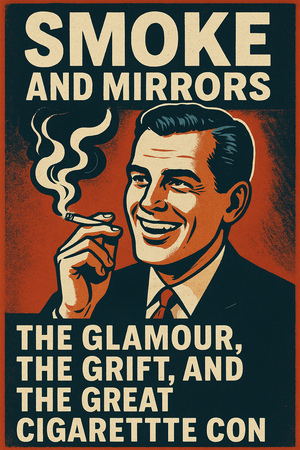When I smoked, I was always somehow convinced that the act of smoking made me seem more attractive. When people asked why I smoked, I would respond, “Isn’t it obvious? I just look so much suaver, as I nonchalantly breath out stinking, acidic smoke, and then stubb out a spit-soaked remnant of material made by the petrochemical industry drenched in a potent neurotoxin that is, in fact, poisonous. I just could never understand why people didn’t understand just how smooth and sleek I appeared. It seemed so obvious to me.
As I got older, I started smoking less, and eventually I just gave up. Now when I see the smokers collected in their little smoking zones, I honestly feel sorry for them. They seem like so many victims, packaged up together, ready to be transferred to the slaughterhouse for their own and society's benefit. It just seems kinder to put them out of their collective misery. How could I have ever thought this act would make me seem more attractive?
Here is a thought. Perhaps I was conned by clever advertising and the sophisticated marketing of an industry trying desperately to justify how a product so obviously harmful and naturally addictive made you seem more sophisticated, more free, richer, happier and much more likely to be skiing this winter in places with odd names like Gstaad.
Probably the most fabulous advert for cigarettes was actually made in South Africa, and it had the payoff line “Peter Stuyvesant: the international passport to smoking pleasure”, and it features sun, snow, jets, fast cars, beaches, skiing, and nightlife, all aimed to evoke an aspirational "jet-set" lifestyle.
Advertising is generally, how should we say, not necessarily a direct route to the truth. But this advert was massively duplicitous for a variety of reasons. It was originally made for the South African launch of the brand Peter Stuyvesant, and it was a fantastic, global success. The brand was eventually exported to over 20 countries.
But obviously to implicitly claim that by smoking this cigarette, there was a chance you would be gambling in Monaco, skiing in Aspen, diving in the Red Sea or cavorting at the Rio carnival was, you know, dubious. But it was particularly dubious in South Africa at the time, because it was made during an era when travel restrictions were beginning to be placed on South Africans because of that thing called apartheid.
Still, people have fond memories of this advert which was beautifully made, presumably because the people making it were gambling in Monaco, skiing in Aspen, diving in the Red Sea and cavorting at the Rio carnival. If ever there was a advertising pitch I would have loved to be part of, it would have been this one. “I tell you what, why don’t we go to 10 fabulous places around the world, and film young, tanned white people having fun. Us, for example”.
Everyone, well, practically everyone, has a “giving up smoking” story, with the exception of people who haven't. They have got their own story about why they still smoke, rooted, one can't help noticing, in self-serving denialism. And please don’t think I’m being judgy: I was as much a teller of these tall tales as anyone. Even now, I remember fondly smoking in bed (yes, we used to do that) - what a glorious, almost spiritual activity, especially after … you know.
But the real lesson of smoking is actually not exclusively along these lines. The deep lesson concerns economics, and as it happens, South Africa is an almost perfect example of this little slice of economic history. The economic questions at issue are the concept of unintended consequences, and the efficacy of state power in influencing citizen activity. Neither of these are small things. For example “unintended consequences” seems so benign, a bit like you accidentally spilt some milk on the way to filling your tea cup.
But “unintended consequences” is actually a euphemism for a right, royal fuck up, and that, jet setting ladies and gentlemen, is what we have in South Africa. The reason it's such a poignant story for SA is because we have a government of overarching righteousness which has no compunction in instructing its constituents in what it thinks is good for us. Combine that with the economic comprehension and aptitude of a cigarette stompie. That combination doesn’t just apply to cigarettes; it applies lots of other things, but particularly this little sector.
Allow me to explain. Since 1964, we have known that cigarettes are bad for you. According to the World Health Organisation (WHO), tobacco remains a top cause of preventable death, responsible for over eight million deaths per year. Still, over 1.1 billion people smoke worldwide, the WHO says, although this number is slowly coming down as governments campaign in various ways against smoking. Roughly one in five adults smoke today, which is down from one in three about a decade ago when the global campaign against smoking really started to take off in earnest. The campaigns started in developed countries, and they have been pretty effective: about 80% of smokers now live in low- and middle-income countries. About 25% of Chinese adults smoke, for example, compared to about 20% in Europe.
The techniques used by governments to stop people smoking have been more or less the same everywhere: bans on advertising, bans on smoking in bars and restaurants and public places, higher taxes, graphic warning labels, litigation and regulation. So one question is this: has the concerted government-led campaign against smoking worked?
Clearly it had an effect, but is this effect higher or lower than you might expect? It's a difficult question - you could argue both directions. My own impression is that despite the drop-off, governments must be disappointed at the results. These are perhaps the most forceful, determined and oppressive regulations ever applied to any sector of the economy - and the effect has been to change the behaviour of 40% of users. Is that a good outcome? I don’t think so. And you can see that in the fact that the government's own targets for future smoking rates now seems unlikely to be met based on current trends.
And when I say “government targets” I don’t mean the targets of everybody in government because the incentives differ. For example, in China, the theoretical national goal is to reduce adult smoking prevalence to 20% by 2030. But the China National Tobacco Corporation, which is state-owned controls around 96% of the domestic market and contributes roughly 7% of government revenue. And this is a more generalised problem. As governments have increased taxes on cigarettes, they have unwittingly increased their own incentive to not apply their own laws as aggressively as their health departments would prefer.
But South Africa is unusual in many respects. First, it already has tough anti-smoking laws on the statute book comparable with developed world norms. However, this is apparently not good enough, and the laws are being further strengthened with the Tobacco Products and Electronic Delivery System Control Bill, which is currently before parliament. And here is the oddity: despite all this righteous public activity, smoking is actually increasing in SA. I am not making this up.
The fact that smoking is increasing is being used as a justification for the harsher legislation which will take brands off cigarettes entirely, and force them under the counter in supermarkets and shops. But actually, the fact that smoking is increasing is justification for doing the precise opposite. The reason smoking is increasing is that research shows the main reason why people started to cut back before the most recent increase is because it got to be quite expensive. Price, not goverment restrictions or packaging rules, was the dominant motivator. But in SA, because there is effectively no enforcement of the existing legislation, never mind what is likely in the more forceful version, the market is gradually being taken over by illegal producers, mainly from Zimbabwe.
And they are, by the way, making absolute fortunes. We know this because the legitimate industry keeps on monitoring the market, and its sales are massively decreasing. They estimate that about 60% of the market is now underground, in the sense that its doesn't pay its full tax obligations.
Yusuf Abramjee, tireless campaigner against crime in SA and member of Tax Justice SA, claims that illicit cigarettes are now sold in 76.6% of stores - almost triple the rate from three years ago. This is costing the country R250-million per day. Just to emphasise, that is per day.
Surely, you might ask, the South African government has a huge incentive to fix this problem; the R28 billion a year in lost earnings could double what the government spends on the Covid grant for example. It's around half the Defence Budget. And yet it does nothing? Not a single person has been arrested for violating the tax laws, Abramjee points out. Why?
Honestly I don’t know. Abramjee says, “We’re witnessing the complete collapse of tax compliance in the tobacco sector. These aren’t just regulatory violations - this is organised crime on an industrial scale, stealing money needed for schools, hospitals and social services”.
Hard to disagree. 💥
From the department of weird facts: one company makes 40% of the world's zips

From the department of really, really, really good news

From the department of things that are actually not pet rocks then ..

Thanks for reading - please do share if you have a friend (or enemy!) you think would value this blog and ask them to add their email in the block below - it's free for the time being. If the sign-up link doesn't appear, you'll find it on the site.
Till next time. 💥





Join the conversation